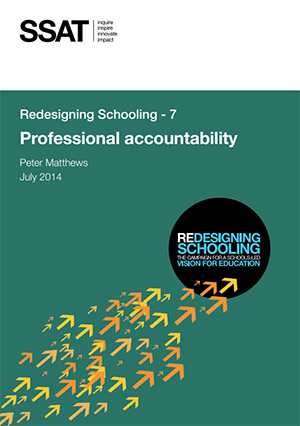
Did you know? You can access 100s of resources by becoming an SSAT member.
Login or enquire today.
Redesigning Schooling – 7: Professional accountability
This seventh pamphlet in the series “Redesigning Schooling – 7: Professional Accountability” by Dr. Peter Matthews, addresses the complex theme of accountability in education, particularly focusing on the role of professional educators within highly autonomous, state-funded schools. The pamphlet is targeted towards education professionals and parents, aiming to explore the intrinsic nature of accountability as part of professionalism in a self-improving school system, while acknowledging the necessity of external accountability measures. It provides practical resources and an audit tool to assist schools in assessing current practices and planning future developments.
The introduction highlights the significance of accountability in the context of autonomous state-funded schools and the intriguing question of its appropriate form in a self-improving school system. It delves into how professional educators fit into the broader picture of imposed accountability mechanisms such as inspections, reviews, appraisals, and performance measures, and advocates for a bottom-up approach to accountability in schooling.
Accountability in schools has many facets, including questions of responsibility, to whom one is accountable, and the types of accountability mechanisms employed. These aspects cannot be fully understood without considering the relationship between accountability and school improvement. The evolution of policy and practice in accountability over the last 20 years, particularly the concept of ‘intelligent accountability’, is explored, highlighting a shift towards balancing external and internal accountability mechanisms.
The publication discusses the increasing individual accountability of schools as their autonomy grows, with an emphasis on assessment, appraisal, monitoring, and evaluation. The role of Ofsted inspections and their impact on schools is examined, noting the range of reactions they provoke, from apprehension to endorsement of success. The generation of information for accountability purposes, both quantitative and qualitative, is crucial for the effective functioning of schools.
Later chapters contemplate a more radical rethinking of accountability in the context of professionalism, exploring what it means to be a professional educator and the responsibility and accountability this entails. The final chapter presents challenges for the profession and regulatory authorities, suggesting a shift from a top-down compliance model to a bottom-up, practitioner-led model driven by principle and intrinsic motivation.
The pamphlet argues for a more teacher-centric approach to accountability, emphasising the integral role of educators in the development and improvement of the schooling system. It proposes a paradigm shift in accountability, moving away from externally driven models to those driven by professional principles and intrinsic motivation to improve educational outcomes.
Recommended reading
Courageous leadership for professional accountability: Assessing quality of teaching without grading lessons
This case study from Uplands Community College highlights the development of an approach to observing lessons that does not involve grading and seeks to build a culture of collaborative professional learning.
Read moreCourageous leadership for professional accountability: Peer to peer challenge and support
This case study details the Manchester Challenge to Support Partnership, a collaborative initiative of four Manchester primary schools, focusing on mutual support, leadership, and improved educational outcomes.
Read moreCourageous leadership for professional accountability: Distributive leadership of teaching and learning
Canons High School's case study exemplifies an innovative, staff-led pedagogical transformation, emphasising professional learning, accountability, and principled curriculum design, leading to improved teaching quality and student outcomes.
Read moreCourageous leadership for professional accountability: Lesson observation with grades
Bridgwater College Academy's case study showcases its innovative shift from grading lessons to empowering teachers through self-assessment, collaboration, and development, leading to enhanced teaching quality and student outcomes.
Read moreCourageous leadership for professional accountability: Developing an innovative culture of learning
Faced with a judgement of ‘requires improvement’ Acklam Grange School made significant changes to develop consistent approaches to teaching alongside collaborative and innovative approaches to professional learning.
Read moreSSAT Membership
Join SSAT to gain free access to our widest range of CPD, programmes, tools and resources.

